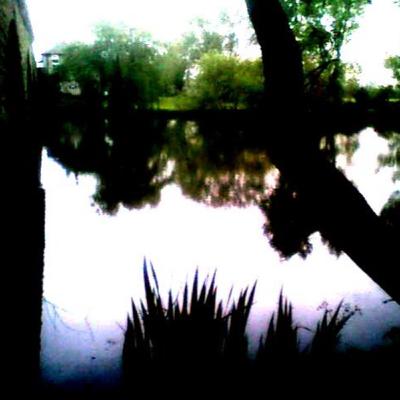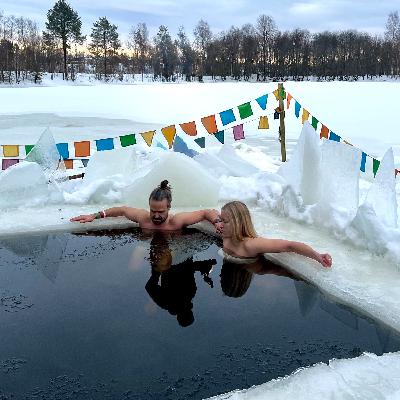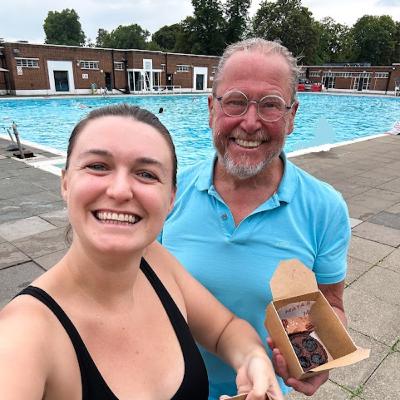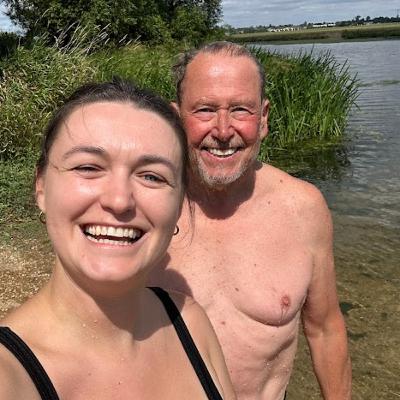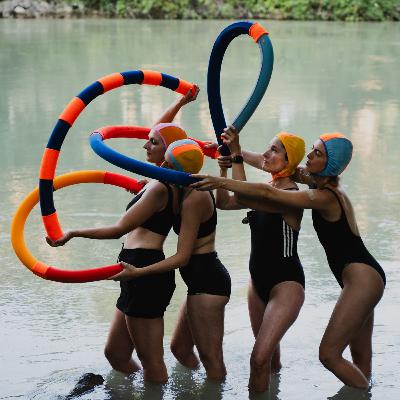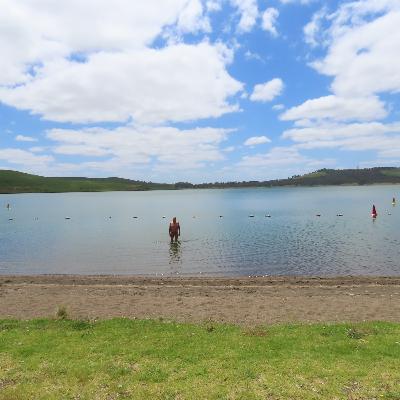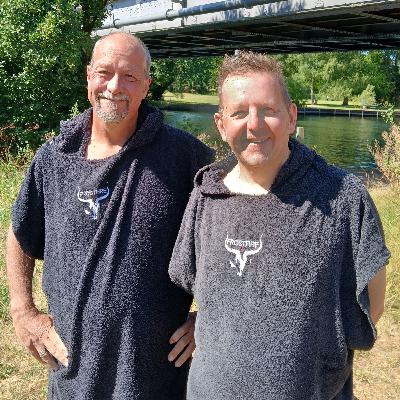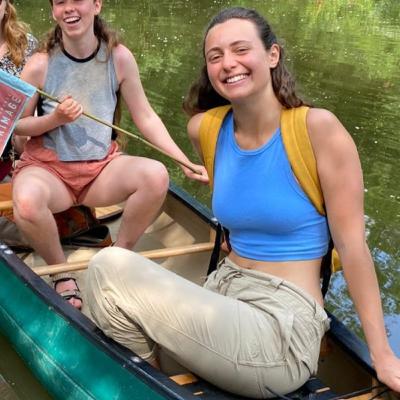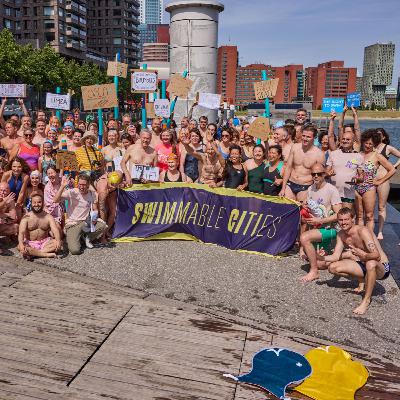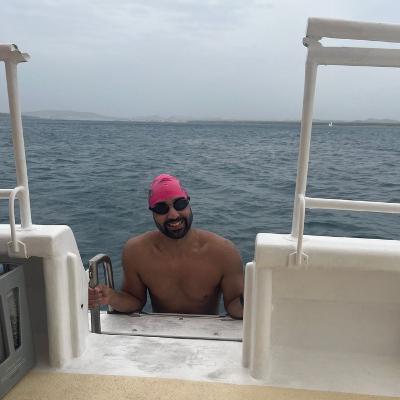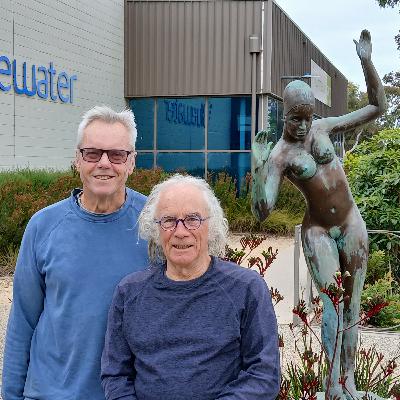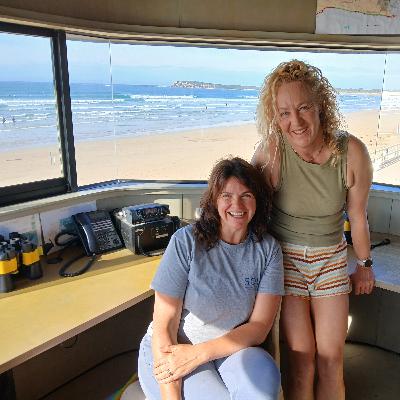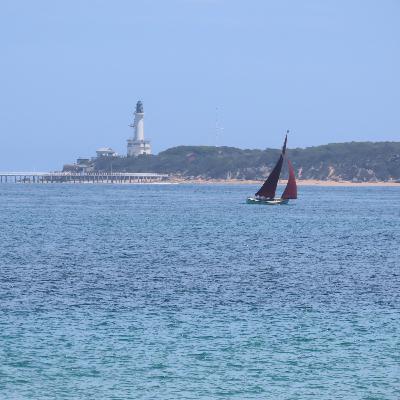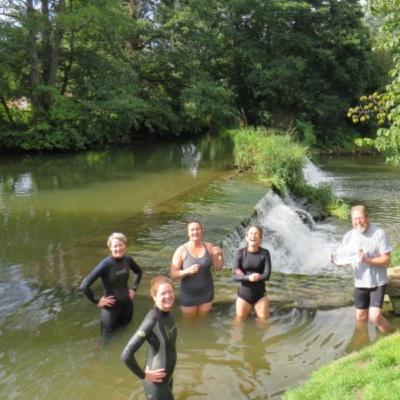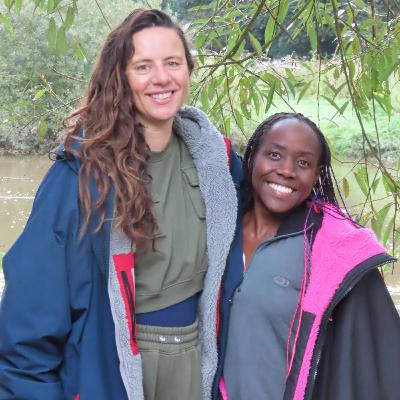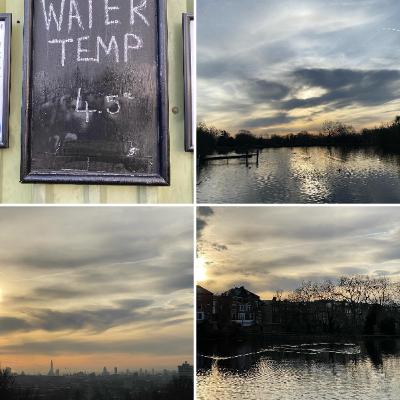Discover Swimmingpod
Swimmingpod

71 Episodes
Reverse
Sian Richardson is founder of the Bluetits Chill Swimmers, a social enterprise that has gone global. In this episode of Swimmingpod, Sian talks about how she got into winter swimming events and about Bluetits in Tallinn and at Lake Bled.
James Bethell is a Lord of the British realm. A former Health Minister and member of the House of Lords. He is a passionate open water swimmer, whose passion has extended to bring open water swimming back to the River Thames in London. In this episode of Swimmingpod, Lord Bethell, James Bethell, talks about his open water passion, and a vision for a swimmable River Thames.
A warm June, 2025; a similarly warm June 2020, but in very different circumstances, both times greeting the solstice sun with a swim. Five years since the pandemic, Stanley Ulijaszekreflects in this podcast on summer solstice swimming and other rituals attached to this time of year at Oxford, both then, and now.
Daniel Allen-Hörnfeldt and Elvira Lundgren swim in Umea, Sweden. A place known for its magnificent wilderness, green and blue spaces, and swimming and winter swimmingscene. They run a very successful local winter bathing place called Umeakallbad. This is their story.
In this episode of Swimmingpod, Stanley Ulijaszek is with cake and pastry specialist Susanna Bowers, swimming at the London Fields and Brockwell Lidos , and eating cake and pastries at Pophams Bakery, Maya’s Bakehouse, and the lido cafe at Brockwell. In doing so, they explore the intimate connection between swimming and cake in London, a city of lidos and bakeries. They read from the Lido Guide, by Janet Wilkinson and Emma Pusill, and from Libby Page's novel The Lido, set in Brixton and Brockwell Lido. There is a literarytheme too – with Tolkein and Lord of the Rings, and Lewis Carroll and Alice inWonderland.
Swimming and cake is a natural combination for many outdoor swimmers. In this episode of Swimmingpod, food expert Susanna Bowers joins Stanley Ulijaszek in Oxford to explore both. They swim at Port Meadow from the Dodo Tree; and later from the Tolkien Bench in the University Park, close by Parsons Pleasure and what was once Dames Delight. Cake is eaten before swimming, then at St Cross College after the first swim, and at the Randolph Hotel after the second swim. Water and food in the fiction works of University of Oxford Professors Charles Dodgson (better known as Lewis Carroll) and J.R.R. Tolkien – Alice in Wonderland, Alice Through the Looking Glass, Lord of the Rings – come to the surface repeatedly.
I never expected to suffer from leptospirosis, although I know that it is a risk. A comment I sometimes hear from passers-by while swimming in the river is “you know you can get Weil’s Disease, don’t you?” My internal response, never spoken, is “Yes, but…” it is so rare that it is hardly on my swimmer’s radar. In retrospect I am surprised by how it took me by surprise when I got it, even though I thought I knew what it looks like. The lived experience of a disease is always very different to what it says in the textbook, although the textbook is essential to knowing how to treat it. So, despite knowing the symptoms of leptospirosis (through reading and talking with other open water swimmers) it surprised me how quickly it took hold of me, how quickly it became distressing, and how quickly I started to lose my mind while at the same time thinking that I was holding it together. This podcast is about that experience, back in 2020.
Amelie Schlemmer swims in Vienna. She is co-founder of SVDK – Swimmverein Donaukanal – the Donaukanal (Danube Canal) Swimming Club. This was founded in 2020 by four students of the Social Design program at the University of Applied Arts, Vienna, as an artistic practice. It soon turned into an open, non-profit cultural association with the ambition of revitalizing urban swimming culture along the Danube Canal. With over 300 members, the association is active along the Danube Canal as it passes through Vienna, and collaborates with various initiatives and institutions within Vienna and internationally. In this podcast we discuss the resurgence of swimming in the Danube Canal in Vienna, and the design work that SVDK have undertaken tomake this happen. Learn more at https://schwimmvereindonaukanal.org/Cover image by Sarah Tasha Hauber
The volcanic Lake Bullen Merri is in Victoria, Australia, cloverleafed in shape. A little over two and a half kilometers across. Swimming here, Stanley Ulijaszek was struck by its deep history, and the history of the aboriginal Djargurd Wurrung peoples here, who were resettled in the late nineteenth century. There is a distressing swimming story here, involving the female leader of these people, Queen Fanny, the name given to her by the Europeans; real name Bareetch Chuurneen. There was a massacre at Lake Bullen Merri in 1839, and Bareetch Chuurneen got away, swimmingacross Lake Bullen Merri with the young child clinging to her back, in the night, not knowing if there would be death on the other side. This podcast is the story of Stanley’s small swim here, and the heroic swim of Bareetch Churneen back in the days of European settlement of Australia. Interval music ‘Bullen Merri’ by Tony Forbes.
Mike Lapworth was the inspiration for my 65 swims at the age of 65 years. He had swum 50 swims at the age of 50 years. Hywel Davies I have swum with across the years, having met while swimming the length of the non-tidal River Thames (in stretches, not all in one go). We original met, Mikeand I, at the Thames at Port Meadow, Oxford, at a pre-pandemic Dodo (pre-Christmas) swim, where Hywel also swam. Mike told me of his 50 at 50, and Hywel persuaded me that 65 swims at 65 was a good idea. Mike has continued his swims, exploring new places, and we recorded this podcast in the small gem of café Nimia, in Eton, after another new swim for Mike, in the Thames there.
Kara Mayer’s mission is to make river swimming around NewYork City safe and free. With her development of + POOL, a water-filtering floating pool for safe recreation in urban waters, she has ignited a series of policy changes that will open up access to the rivers for all New Yorkers. Thisis being trialled in the Summer of 2025, and the implications of her work for outdoor urban bathing are huge, in terms of policy, technology and knowhow. Her moto – perseverance– is one for all water quality advocates. In this podcast we discuss how the idea of the world’s first floating filtration pool came about, and how she has persevered in bringing this to fruition.
Why we swim can often be political, and swimmer Grace Wright-Arora has completed research on pollution, activism and alternative water knowledges among users of the River Avon, near Bristol. Central to this work is understanding why people swim in the Avon, despite knowing of the often high risks of exposure to pollution and even infection there. This podcast is about her swimming experiences, how Conham river bathers navigate uncertainty and risk of exposure, and the politics of Avon River management.
Hot town, summer in the city, and a meeting like no other. For an urban swimmer, to have a bathing platform outside the conference venue, starting on Day 1, World Bathing Day, 22nd June, with a jump into the very clean waters of the Rijnhaven, Rotterdam, is a perfect start to two days of deliberation and information sharing. Around 200 people representing organisations from around the world assembled with the aim of promoting urban swimming, and through this, raising awareness about the potential for urban swimming to regenerate waterways, improve liveability and grow climate resilience. This podcast captures some of the voices of the Summit, which connect participants engaged variously in transformation of urban waterways and improving their swimmability. Interviewees include Henk Ovink, Katie Pumphrey, Charity Mosienyane, Marilotte Stemedink, Mark Turpac, Maja Beck, Marie Roende-Becker, Peggy Knudsen, Benjamin David, Christoph Bosshardt, Hans Henrik Heming, ChristineGuldborg Christensen, Simon Laing, Loretta Bellato, Andy Bevan, Innes Miller and Rebecca Olive. Thanks go to co-interviewer Fiona Gibson.
Luke Belfield is a force, undertaking feats of running and swimming which would tax any mortal. As someone who developed arthritis in childhood, with some remissionand then resumption in early adult life, he could have accepted the ruling of the ancient Greek three sisters of fate. But he didn’t. Very successfully, he has been weaving his own destiny with the thread that he has been given, by, in his own words, considering his body as an instrument and not an ornament. In this podcast, we talk about his athletic journey, from running the Athens marathon and ironman, to marathon swimming. He swam the Bosporus in 2024, and at thetime of recording, is preparing to swim the English Channel solo. Preparation, intelligence, reflection and awareness are central to his toolkit, both in his athletics and in raising awareness about childhood arthritis and empowering youngpeople with this condition.
Tony Forbes and Col Ritchie are regulars at the annual Pierto Pub ocean swim in Lorne, Victoria. This can be a fierce race, when swimming can be a contact sport. Notwithstanding this, this fearsome duo amount nearly a century and a half of life experience between them, and swimming enough Pier toPubs leads to the honour of receiving a shark bait award, two or more if you live long enough and/or you don’t get taken by a shark. Tony and Col take it seriously enough to train regularly in their local pool. Which is where I jointhem, one crisp Australian spring morning.
Sarah Quinn taught me to say ‘You never regret a swim’ and Ihave been saying it now for decades. And I don’t and nor does she and nor does Amenah McDonald. Sarah and Amenah have a beautiful connection through the ocean atOcean Grove, Australia. Amenah plans her week around how the surf is going to be, while Sarah reads the water every morning on the way to dropping her kids off at school. Both live close to the ocean and are in every day if it letsthem – the water is their friend, but sometimes it can be treacherous. Amenah is Captain and Director of Lifesaving Operations at Ocean Grove Lifesaving Club, overseeing safety at this beach. In the summer, there can be up to 10,000people here, and maintaining safety is paramount, while not getting in the way of people’s enjoyment of the water. There is a lively group of women who swim and surf here, and they follow their swims with a weekly life debrief – how islife treating you, what’s going on, whats troubling you? Life revolves around the water here, and companionship is key. This podcast was recorded at the look-out tower that is the focal point for safety here, the Ocean Grove Lifesaving Club.
Stanley Ulijaszek offers some reflections about swimming in Victoria in Australia on the coast at Queenscliffe. On a beautifulbeach, long and stretching towards a point to the left and another to theright, at Point Lonsdale. A swim with a Hopper-esque sailboat sailing in gentlebut business-like fashion, in front of the lighthouse that signals the pointwhere Australia lost a Prime Minister to the water and to the waves. RustCloud, Richard Serra, rusted iron slabs of sails sculpted by the wind. Strongerout there than here in gentle crawl parallel to the sandy shore. What three wordstell the world where I am? Iterative.underwrite.swimming. A day of sun andswimming to rain and a broken car key. From delight to distress and back again.
There is a lot of good swimming to be had in the Bristolregion, with several vibrant and active outdoor swimming scenes in the region - in the city itself, but also in the nearby River Avon, in the River Brue, in the Avon estuary, and in the sea at sand point. If you can go a mile or ten out of Bristol there is a lot of choice - at Weston Super Mare there are several lido beaches to choose. River swimming at Bradford upon Avon (the river Avon upstream) is a scenic delight. People really care about their swimming here. Thesetwo accounts of swimming around Bristol are extracts from my book ‘Memories like Water – Swimming in 65 places at the age of 65’. They took place as pandemic lockdowns eased in 2020, which gave them a surreal edge – can wereally swim together again? At Cleveden Marine Lake, and at Farleigh and District River Swimming Club, just south of Bath.
Charlotte Sawyer is a documentary film maker and photographer who captures cinematic stories that cross cultures and boundaries. She has worked in conflict zones and places vulnerable to climate change, notably Iraq, Ethiopia and Nigeria. Aggie Nyagari is a Kenyan film
and TV director, who brings the diversity of her life experiences into her work. Charlotte and Aggie both live, swim and work in Bristol. Together they have made a
beautiful new film - Rave On for the Avon - capturing the Conham Bathing Group communities love for their river, and their fight for to gain Bathing Water Quality status for it. This podcast was recorded at Conham, where Stanley Ulijaszek, Charlotte Sawyer and Aggie Nyagari talk about the film and its making, and the River Avon and its swimming people.
Tom Kearney is a Hampstead resident of over a quarter of a century and year-round swimmer at the nearby Ponds. He has a life well lived. In this podcast we talk about that life and the very special place that swimming in open water has in it. The late Al Alvarez, poet and author of the book ‘Pond Life’, Tom’s friend in Hampstead, brought him to swimming at The Ponds, something that he says has saved his life. On the eighteenth of December 2009, Tom was knocked over by a bus in London’s Oxford Street, and was in near-death coma for two weeks, making a miraculous recovery subsequently. We talk about how the accident transformed his life, and how daily swimming is central to this transformation. We talk about poetry and The Ponds. About the central importance of family, of living each day to the full. About his campaigning for bus safety in London - ‘If you shut up truth, and bury it underground it will but grow’ (Emile Zola). For Tom, campaigning and swimming outside all year round are not dissimilar - they're uncomfortable, require both physical
and mental stamina, and every time you do it you achieve something that, in a different life, you'd have thought impossible. We talk about how life is serious business, but there is plenty of time for laughter, especially in relation to the East German Ladies Swimming Team (a Hampstead Men’s Pond thing), which Tom is also a central part of. Tom brims with positivity, a Hampstead intellect who swims and appreciates all that life can offer.




